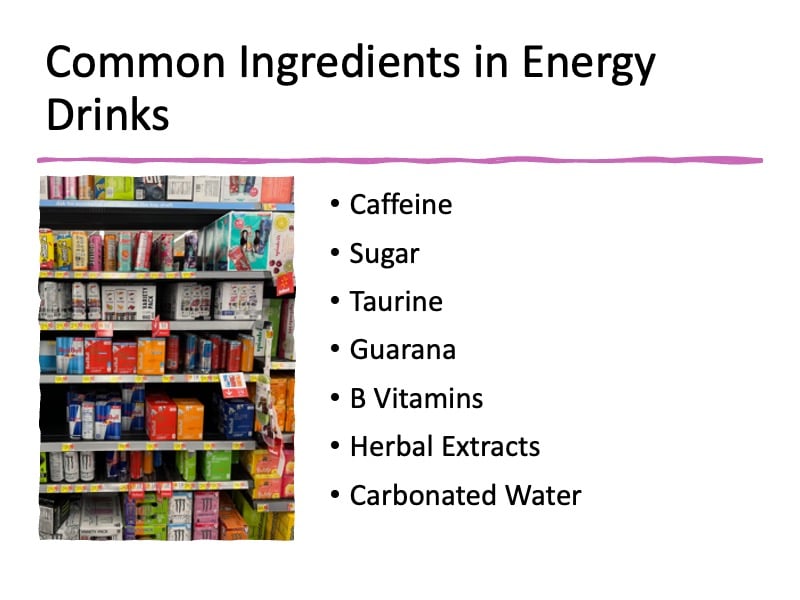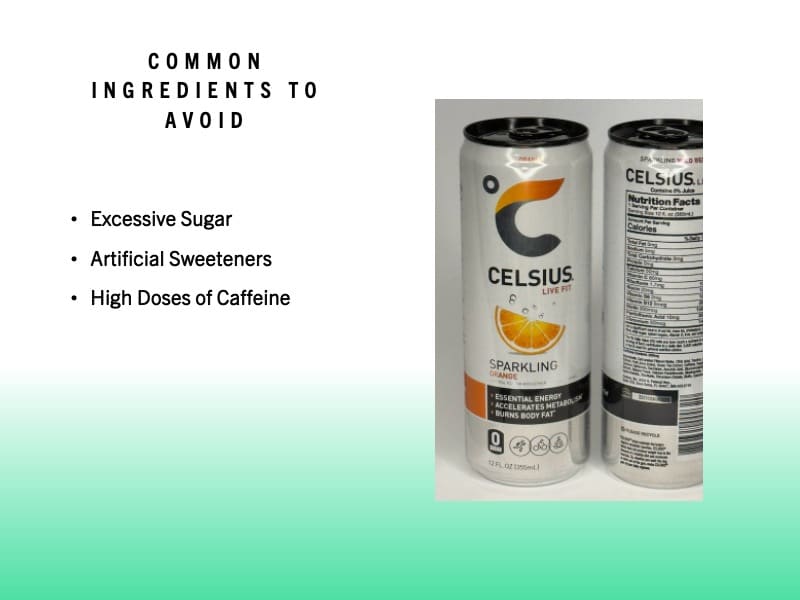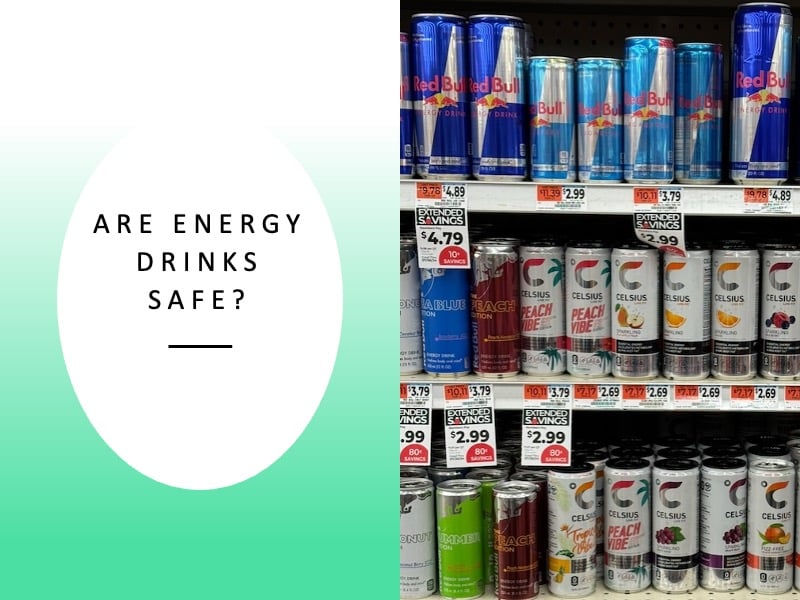Are Energy Drinks Safe or Are Energy Drinks Bad for You?
Energy drinks are a booming industry, with millions of people turning to them for quick energy boosts. However, concerns about their safety are also rising, with studies showing mixed effects on health.
A systematic review found that regular energy drink consumption can increase the likelihood of adverse effects like insomnia, jitteriness, and even cardiovascular issues (Nadeem et al., 2021).
Given these risks, it is critical for consumers who rely on these for daily energy to understand which are the healthiest energy drinks and which you should avoid!
Why Do People Drink Energy Drinks?
Energy drinks are popular for enhancing physical and mental performance, often appealing to people seeking a quick boost in energy and focus.
They are commonly marketed towards athletes, students, and professionals who need to sustain long periods of concentration or physical exertion.
These drinks are also widely used to combat fatigue and sleepiness, particularly among those with demanding schedules or high-pressure jobs.
The main appeal lies in their high caffeine content, which temporarily enhances alertness, endurance, and cognitive function.
However, while they provide an immediate energy boost, energy drinks can lead to negative side effects, especially when consumed in large amounts.
Common Ingredients in Energy Drinks

Most energy drinks contain a mix of caffeine, taurine, sugars, and other stimulants such as guarana and ginseng.
These ingredients work synergistically to provide users with increased energy and improved focus.
- Caffeine: The primary active ingredient, caffeine stimulates the central nervous system, temporarily increasing alertness and warding off fatigue.
- Taurine: An amino acid often included for its potential role in improving athletic performance and reducing muscle fatigue.
- Sugars: Common in many energy drinks, sugars offer a quick source of energy but can also cause a rapid spike followed by a crash.
- Guarana and Ginseng: These natural stimulants are often added to enhance the energizing effects of caffeine. Guarana is a potent source of caffeine, while ginseng is believed to improve mental clarity and reduce fatigue.
While these ingredients may boost energy and concentration, they can also lead to side effects such as jitteriness, anxiety, rapid heart rates, and gastrointestinal discomfort, especially when consumed in high amounts (Alsunni, 2015).
Common Ingredients to Avoid

Certain ingredients in energy drinks should be avoided, especially in excessive amounts.
- Excessive Sugar: Many energy drinks are loaded with high amounts of sugar, which can contribute to obesity, insulin resistance, and metabolic disorders. A typical energy drink can contain as much as 27–55 grams of sugar per serving, far exceeding recommended daily intake levels.
- Artificial Sweeteners: Some sugar-free energy drinks use artificial sweeteners like aspartame or sucralose, which can also have negative health effects, including digestive issues and potential links to metabolic problems.
- High Doses of Caffeine: While caffeine can be beneficial in moderate amounts, energy drinks often contain excessive caffeine levels. Consuming too much can lead to arrhythmias, hypertension, and sleep disturbances (Kaur et al., 2022).
Related Reading: Natural vs Synthetic Caffeine: Which is Healthier & Better?
Healthiest & Safest Energy Drinks
For those seeking a natural and healthier alternative to energy drinks, beverages like green tea, matcha, and yerba mate provide an energy boost with added health benefits.
These alternatives are free from artificial stimulants, sugars, and excessive caffeine, which helps to avoid the crashes and side effects commonly associated with energy drinks.
1.) Celsius Energy Drinks
When it comes to the healthiest energy drinks, Celsius is my #1 choice, and I believe it is the safest energy drink that is widely available.
Celsius is known for its blend of natural ingredients like green tea extract, guarana, and ginger, all of which contribute to a cleaner energy boost compared to traditional energy drinks like Red Bull or Monster.
One of the most significant advantages of Celsius is its lack of added sugars and artificial stimulants. Instead of relying on high sugar content to provide a temporary energy spike, Celsius focuses on ingredients that support overall health and metabolism.
For instance, green tea extract and ginger not only provide energy but also help enhance fat-burning and improve metabolism (Costantino et al., 2023).
This makes Celsius particularly popular among fitness enthusiasts and individuals seeking an energy boost without compromising their health.
Pros and Cons of Celsius Energy Drinks:
Pros:
- Supports metabolism and fat burning with ingredients like green tea and ginger
- Contains natural caffeine sources like green tea extract and guarana
- No added sugars or artificial stimulants, making it a cleaner option for sustained energy
- Includes ingredients like ginger, which have anti-inflammatory and digestion-boosting benefits
Cons:
- Higher caffeine content (200 mg per can) may not be suitable for individuals who are sensitive to caffeine or prone to jitteriness
- The intense energy boost can lead to insomnia or restlessness if consumed late in the day
So, is Celsius bad for you, or is it a healthy energy drink option?
In general, Celsius drinks are considered one of the healthiest energy drink options available.
Unlike traditional options like Red Bull or Monster, Celsius does not contain high amounts of sugar or artificial ingredients that can contribute to long-term health issues such as weight gain or heart problems.
- Celsius vs. Red Bull: Celsius offers a cleaner energy source, free from the high sugar levels and artificial stimulants found in Red Bull. While Red Bull relies heavily on sugar and taurine to provide a short-term energy boost, Celsius provides longer-lasting energy with natural ingredients that also support metabolism.
- Celsius vs. Monster: Monster energy drinks are typically packed with sugar and artificial ingredients, which can lead to a rapid energy spike followed by a crash. Celsius, on the other hand, avoids these pitfalls by using natural caffeine sources and metabolism-boosting ingredients like green tea and ginger, making it a much healthier option.
One notable advantage for athletes and professionals is that Celsius drinks will not make you fail a drug test.
All ingredients are natural and do not contain any banned substances that might trigger a false positive, making it a safer option for those who are subject to drug testing.
Additionally, celsius’s natural ingredients, like green tea extract and guarana, provide a smoother energy boost without causing the typical sugar crashes associated with other energy drinks.
However, it’s still important to monitor your caffeine intake.
Each can of Celsius contains 200 mg of caffeine, which can cause jitteriness, anxiety, or sleep disturbances, especially if consumed in excess.
Moderation is key, as even healthy energy drinks like Celsius can lead to unwanted side effects if consumed irresponsibly.
For a convenient, safe, and affordable energy drink option, I suggest you try the Celsius on-the-go packets, which are the same formula but cheaper per serving!
Last update on 2025-07-15 / This article includes affiliate links/Images via Amazon Product Advertising API. I may earn commissions on purchases made through these links.
2.) Bloom Energy Drinks
Bloom Energy Drinks are one of the healthiest energy drinks on the market due to their thoughtful formulation and natural ingredients.
Each 12-ounce can contains 180 mg of natural caffeine sourced from green coffee bean extract, providing a clean energy boost without the jitters or crash often associated with synthetic caffeine.
In addition to caffeine, Bloom Energy Drinks incorporate prebiotic fiber, specifically galactomannan, which supports digestive health by promoting a balanced gut microbiome.
While the exact efficacy of galactomannan as a prebiotic is still under review, its inclusion reflects a commitment to digestive wellness.
- The drinks also feature L-theanine, an amino acid commonly found in tea leaves, known for promoting relaxation without drowsiness.
- When combined with caffeine, L-theanine can enhance cognitive performance and attention, offering a balanced and focused energy experience.
- Moreover, Bloom Energy Drinks are formulated with zero grams of sugar, utilizing natural sweeteners to provide a pleasant taste without the added calories or risk of blood sugar spikes associated with traditional energy drinks.
By combining natural caffeine, digestive support through prebiotics, cognitive enhancement with L-theanine, and a sugar-free formulation, Bloom Energy Drinks offers a health-conscious alternative for individuals seeking sustained energy and overall well-being.
Last update on 2025-07-15 / This article includes affiliate links/Images via Amazon Product Advertising API. I may earn commissions on purchases made through these links.
3.) Zevia Zero Calorie Energy Drink
Unlike Celsius, the other healthy energy drinks on my list are not commonly found in grocery stores near you.
However, they are excellent energy drink options if you order them online or find them in-store.
Zevia Zero Calorie Energy Drink is an excellent choice for those seeking a healthier energy drink without the sugar and artificial additives found in traditional options. Importantly, I believe it is the best alternative to Celsius drinks, which I consume most often.
Zevia is naturally sweetened with stevia, making it a zero-calorie beverage, and it contains no artificial colors or flavors. It provides 120 mg of caffeine sourced from coffee beans, which delivers a steady and clean energy boost without the crash or jitters.
Additionally, Zevia is available in a variety of flavors, offering a refreshing alternative for health-conscious individuals.
Pros:
- Zero calories and no added sugar
- Sweetened with natural stevia
- No artificial colors or flavors
Cons:
- Lower caffeine content (120 mg) may not be sufficient for those needing a stronger energy boost
Last update on 2025-07-15 / This article includes affiliate links/Images via Amazon Product Advertising API. I may earn commissions on purchases made through these links.
4.) Alani Nu Energy Drinks
Alani Nu Energy Drinks are crafted to provide a substantial energy boost while accommodating various dietary preferences. Here’s an overview of their key features:
- Caffeine Content: Each 12 oz can contains 200 mg of caffeine, sourced from natural ingredients, offering a significant energy lift suitable for demanding activities.
- Zero Sugar: Alani Nu energy drinks are formulated without added sugars, utilizing alternative sweeteners to deliver flavor without the associated calorie intake.
- Essential Vitamins: Enriched with B vitamins, including B6 and B12, these drinks support energy metabolism and overall well-being.
- Amino Acids: Ingredients like taurine and L-carnitine are included to aid in energy production and muscle function, appealing to fitness enthusiasts.
- Dietary Friendly: Alani Nu products are gluten-free and vegan, making them accessible to individuals with specific dietary requirements.
- Variety of Flavors: Offering a diverse range of flavors, Alani Nu caters to different taste preferences, enhancing the consumer experience.
For those seeking a potent, sugar-free energy drink that aligns with various dietary needs, Alani Nu presents a compelling option.
For a cheaper and more portable option, I suggest the Alani Nu Energy Sticks, which have the same formula.
Last update on 2025-07-15 / This article includes affiliate links/Images via Amazon Product Advertising API. I may earn commissions on purchases made through these links.
5.) Clean Cause Yerba Mate Energy Drink
Clean Cause Yerba Mate is another of the healthiest energy drink alternatives, offering a smoother energy boost with its natural caffeine content derived from yerba mate.
It provides 160 mg of caffeine per can, enough to fuel your day without the jittery effects commonly linked to synthetic caffeine.
Clean Cause Yerba Mate is also low in calories and contains antioxidants, supporting overall health while delivering sustained energy.
Additionally, Clean Cause donates 50% of its profits to addiction recovery initiatives, making it a socially responsible option.
Pros:
- Made with organic yerba mate for natural caffeine and antioxidants
- Supports a good cause, with 50% of profits going to addiction recovery programs
- Lower calorie content compared to other energy drinks
Cons:
- Yerba mate’s flavor may not appeal to everyone
Last update on 2025-07-15 / This article includes affiliate links/Images via Amazon Product Advertising API. I may earn commissions on purchases made through these links.
Final Thoughts: Should You Drink Energy Drinks?
Whether or not to drink energy drinks depends on your personal health goals, tolerance to caffeine, and awareness of the potential side effects.
While energy drinks like Celsius, Zevia, and Clean Cause offer healthier alternatives to traditional, sugar-laden beverages, they still contain significant amounts of caffeine, which can cause issues like jitteriness, sleep disturbances, or anxiety in sensitive individuals.
For many people, energy drinks can be a convenient way to boost focus and performance, but it’s essential to consume them in moderation and choose cleaner, more natural options.
If you’re looking for a safer way to stay energized, exploring natural alternatives like green tea, yerba mate, or matcha may offer sustained energy without the downsides of artificial additives or sugar crashes.
Ultimately, the key is balance—whether through mindful consumption of energy drinks or transitioning to more natural energy sources that support long-term health.
This website does not provide medical advice. This website site does contain affiliate links, and purchases may earn a commission.
Read my Medical Disclaimer, Review Disclaimer, and Publishing Policies for more details. Use of this site indicates acceptance of these terms.








